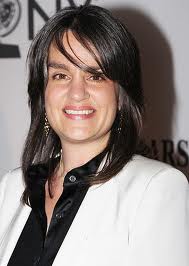
Michael Countryman, Raffi Barsoumian, Daniel Radcliffe and Reg Rogers in Privacy (photo by Joan Marcus)
Last week, The New York Times reported on a dispute between Theatre for a New Audience, one of the city’s major producers of classical theatre, and the acclaimed director Sam Gold. Gold had withdrawn from directing the company’s planned production of Hamlet, which was to star Oscar Isaac, the stage veteran and rising movie star. Gold cited artistic differences with TFANA’s leadership as the cause for the break, and the company’s artistic director was uncharacteristically public with his dismay. According to the article, Gold was shopping the production to other theatres, notably the Public Theater, and it appeared that he would be taking Isaac with him.
With only one side giving their account of the conflict, it’s impossible to parse what happened when, and who said what to whom. My attention, instead, drifted to the last paragraph of the article, which read: “Theatre for a New Audience ended up quickly making arrangements for a Measure for Measure production, directed by Simon Godwin, for next June. Without a star like Isaac, the theatre projected, Measure would make half the money that Hamlet would have.”
While Hamlet tends to be more popular than Measure in general, the implication of the article’s closing sentence, reflecting the sentiments of TFANA, is that the real loss is that of the ‘name’ performer, which will have an impact on the bottom line. That may well be true, though if it’s important to their planning, certainly the company has choice roles in Measure to offer up to other capable stars. I think Jessica Chastain would be a terrific Isabella, for example.
But should Off-Broadway companies be predicating their health on their ability to attract stars? Aren’t stars the essential ingredient of Broadway, with vastly more seats to fill and at a higher price?
That’s not to say that the idea of stars Off-Broadway is a new concept. I think back to the late Jessica Tandy at the Public in the early 1980s in Louise Page’s Salonika as an example of a legendary actor taking a role in a venue much smaller than the Broadway houses to which she was accustomed. But have we reached a point where the major Off-Broadway companies, subsidised theatres all, need names who have established themselves not just in the theatre, but in television or film as well?
Earlier this year at the Public, we saw Claire Danes, John Krasinski and Hank Azaria in Sarah Burgess’ Dry Powder, and right now Daniel Radcliffe is there in James Graham’s Privacy. This fall will see Rachel Weisz in David Hare’s Plenty. New York Theatre Workshop will have Daniel Craig and David Oyelowo in Othello (also directed by Sam Gold). George Takei will be at Classic Stage in John Doyle’s revival of Pacific Overtures. Matthew Broderick was at the Irish Repertory Theatre in Conor McPherson’s Shining City until just a couple of weeks ago. And so on.
None of this is invoked to question the talents of the actors involved, who absolutely should have the opportunity to do work on stages other than Broadway, even after they’ve achieved a level of fame that might well sustain a commercial run on the Great White Way. It’s also a credit to these companies that stars will forego the income and amenities of film, TV and Broadway to consider working there. The phenomenon is not new, though anecdotally it seems more prevalent than ever before.
But with more TV and film stars seemingly taking leading roles Off-Broadway as well as on, especially when it comes to plays, is the opportunity for solid working actors to be discovered in smaller houses being incrementally lost? After all, this year’s Tony winner for best featured actor in a play, Reed Birney, has only been in Broadway shows four times in his career, and there was a gap of more than 30 years between his first and second opportunity. It was Off-Broadway (and Off-Off-Broadway) that sustained him, but if more stars take leading roles, how will fine actors such as Birney manage to maintain their careers?
There’s no question that it is a special thrill to see a star who is also a superb actor in a small venue. But it is also a thrill to see great actors who may not yet have been ‘discovered’ and to watch younger actors hone their craft in major roles, as was the case with Nina Arianda in Venus in Fur. If the need for stars, that some bemoan is now a driving, even essential, force on Broadway, has trickled down to Off-Broadway as well, theatre may be denying itself the opportunity to create its own stars and falling prey to the drive toward ‘celebrity first’ that has permeated our culture. Indeed, this is reinforced by media outlets that only give coverage to theatre when there are big names on the stage; good work is no longer enough to merit mainstream media attention in many cases.
Off-Broadway seemed a place where theatre was holding out against this, but perhaps it has already lost its standing as a place where talent alone rules, with economic pressures increasingly underlying some creative choices. The question is whether it’s too late to do anything about it, or whether anyone actually wants to.







